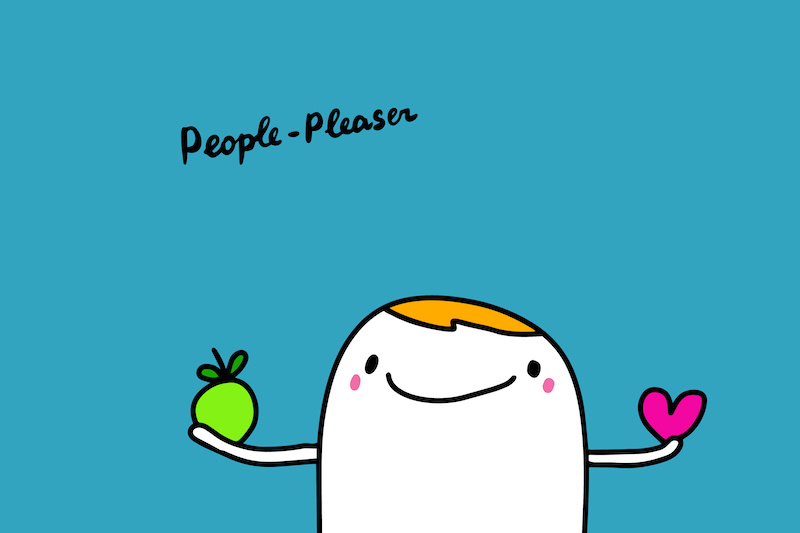Everyday Struggle of a Notorious People Pleaser

Guest post by Joanna Rogowska:
I like to reward myself at the end of the week with a delicious meal with friends. It’s my weekly treat. I also like to check out new restaurants. So when my two good friends Lucy and Jane suggested meeting in our favorite burger place, I proposed a new Japanese restaurant instead. I had heard good things about the food and what caught my interest was their new interactive ordering system with overhead projection technology.
I’d read that each table in the restaurant was equipped with a built-in tablet. You could select your virtual tablecloth, explore the menu, project a picture of the meal onto your table, and of course, also order your food. I love new technological gadgets!
When we arrived, I fell in love with this place straight away – beautiful and authentic Japanese decor, lotus flowers, cherry blossoms, bamboo benches, and high-tech tables. A fantastic combination of traditional and modern Japan.
Lucy and I started ordering the meal, getting all excited about it. It was a really cool experience to be able to project the picture of each meal onto the plate in front of you. We played around with changing virtual table cloths, debating which one we were going to choose for our table. I realized that I was feeling something.
Playful, connected, excited, and happy.
As we were exploring the technological possibilities at our table, Jane suddenly called the waiter over and asked for a paper menu. “I really don’t know how to make this digital stuff work!” she told us. “It’s really not intuitive and annoying. I prefer a normal menu.”
Suddenly my pleasant feelings disappeared and a big sense of heaviness took their place. I suddenly felt overwhelmingly bad. I looked at Lucy and she seemed to continue enjoying looking through the menu and ordering her meal. But for me, as soon as Jane asked for a paper menu, I stopped enjoying the evening.
In the past, before learning how to master my emotions, I would have sat miserably throughout the rest of the meal feeling confused and simply “bad.” I would have let this ruin my evening. Now I knew better, and it was time to check in with my feelings to investigate what was going on. So I tuned in to my emotions.
Annoyed, Irritable.
Makes sense. I was looking forward to dinner today and suddenly I was not able to enjoy it. My intention was to relax and have a good time and now I was far from that, so I felt angry. But the big question was, why was I not enjoying the evening? I knew I had to dig deeper to find the right feelings.
Insecure, awkward, guilty, and ashamed.
As soon as I identified shame, I felt a sense of relief. It made so much sense for two reasons. First of all, I know I am a compulsive people pleaser. I tend to always put other people’s needs in front of my own. I cannot have a good time if I see that my friends are not enjoying themselves. So seeing Jane not enjoying the technology made me feel guilty for suggesting to go there.
But I knew there was more behind this feeling so I dug deeper. I had known that Jane was not a big fan of technology, yet I had still suggested this restaurant. How could I have been so inconsiderate? All I could think of was the fact that I was stupid because I couldn’t even pick the right restaurant for my friends…
Going through these feelings in my head brought me a sense of relief. I was feeling less and less overwhelmed and uncomfortable and beginning to feel some new feelings.
Clear, confident, and capable.
My feelings reminded me that the well-being of my friends was important to me. So I thanked my feelings for drawing my attention to the situation. I accepted my feelings and released them. I also accepted that my inner critic blew the situation slightly out of proportion, as things were actually going well. It was difficult to accept that, but it felt liberating to do so.
Finally, I reassured myself that Jane, having received her paper menu, was enjoying selecting her meal in a more traditional way and no one was thinking any less of me for choosing this location.
I once again felt what I had felt at the beginning of the evening.
Connected, joyful, and excited.
The dinner turned out to be fantastic. We had a great time and we were pleased with the new discovery we made and the food we ate.
How quickly I could have let my emotions take over and ruin my evening if I hadn’t paid attention to them and made the effort to understand them. That was a reminder to me once again of how important it is for me to observe myself and try to understand my feelings.
The author, Joanna Rogowska, is a researcher for FeelingMagnets.com. Feeling Magnets are a helpful tool to get you more in touch with your emotions and learn how to use them.
To learn more about how to recognize, use, and express your emotions see the book, Running on Empty.
